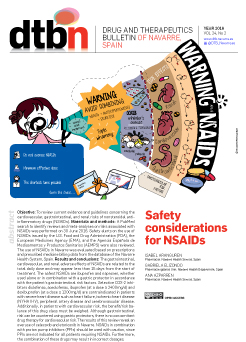
DTB: Vol 24, No 2
Safety considerations for NSAIDs
The gastrointestinal, cardiovascular, and renal adverse effects of NSAIDs are related to the total daily dose and may appear less than 15 days from the start of treatment. The safest NSAIDs are ibuprofen and naproxen, whether used alone or in combination with a gastric protector in accordance with the patient’s gastrointestinal risk factors. Selective COX-2 inhibitors diclofenac, aceclofenac, ibuprofen (at a dose ≥ 2400mg/d) and dexibuprofen (at a dose ≥ 1200mg/d) are contraindicated in patients with severe heart disease such as heart failure, ischemic heart disease (NYHA II-IV), peripheral artery disease and cerebrovascular disease. Additionally, in patients with cardiovascular risk, the benefit/risk balance of this drug class must be weighed. Although gastrointestinal risk can be countered using gastric protectors, there is no concomitant drug therapy for cardiovascular risk. The results of this review reveal an overuse of celecoxib and etoricoxib in Navarre. NSAIDs in combination with proton pump inhibitors (PPIs) should be used with caution, since PPIs are not indicated for all patients requiring NSAIDs. Furthermore, the combination of these drugs may result in incorrect dosages.
Authors:
- Isabel Aranguren. Pharmacist. Navarre Health Service. Spain
- Gabriela Elizondo. Pharmacist. Pharmacovigilance Unit. Navarre Health Department. Spain
- Ana Azparren. Pharmacist. Navarre Health Service. Spain







